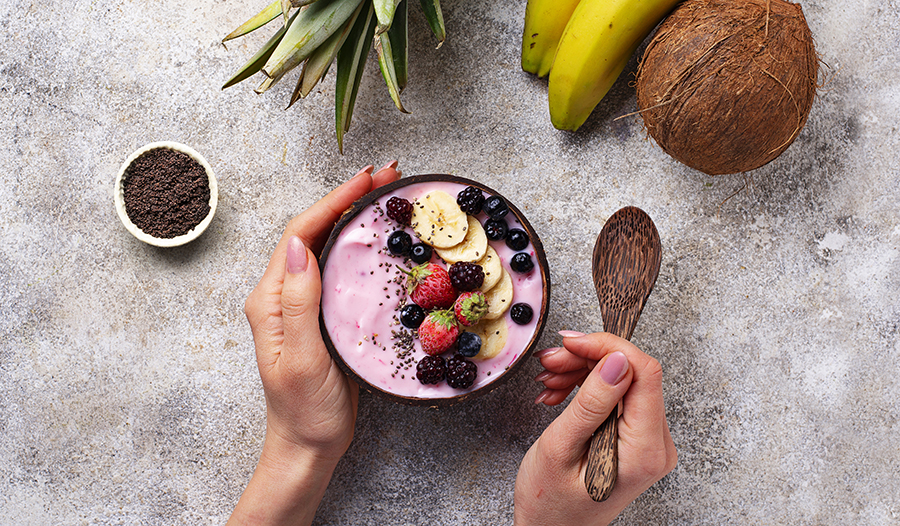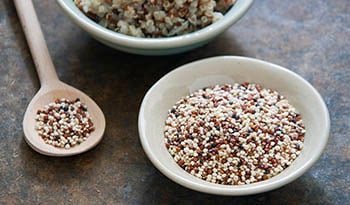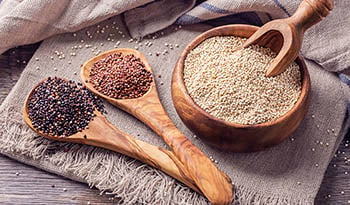5 Healthy Reasons Why Acai Is a Superfood That Is Here to Stay
DISCLAIMER:This blog does not intend to provide diagnosis...

In recent years, acai has become a popular food item available in many different forms, from frozen fruit mixes to juice, powders, and a wide variety of other supplemental forms. Many may recognize its deep purple color and be aware that it provides numerous health benefits, but why exactly is acai considered such a healthful food? There is plenty to discuss on this topic as the assumed health benefits associated with acai reach far and wide.
While discussing the benefits of consuming acai, however, it is important to recognize that while there is research, more studies are needed to confirm many of the benefits that are currently thought to exist. Let’s dive into everything acai has to offer, from origin and versatility to research-based health benefits.
What is Acai?
Acai is a fruit, often referred to as a berry despite having a pit, that comes from the acai palm tree, which is natively found in Central and South America. Often recognized by its deep reddish-purple color, this vibrant hue is part of the reason acai is considered such a healthful food. Oftentimes in nature, the more vibrantly pigmented fruits and vegetables are those that tend to house the most nutrients, and especially antioxidants (more on that later.)
While you may have only begun to hear about acai in the last several years, it has been a prominent food item for those in Central and South America for thousands of years. In fact, the literature indicates that Amazonian tribes, past and present, use acai to treat a number of different health ailments and believe that it helps to boost the immune system, fight off infections, and even support heart health. It has only been in the last decade that acai has been recognized for its health benefits in other parts of the world and has become a more popular food and supplement.
How Are Acai Berries Used?
The options are truly endless here! Acai berries naturally have a tough outer skin that is softened in order to be eaten. Once the berries have been soaked and softened, they are often mashed with a fork to create a paste that is frequently paired with meals by those living in the Amazon rainforest. You’ll often find acai in the form of a pressed fruit juice, frozen puree, or turned into acai powder that can be added to your choice of liquid or semi-solid food products. You may even see acai used as a flavor in processed food items, like candy and ice cream, and in body products, like lotion and oils.
4 Acai Health Benefits
While you can blend acai fruit into a smoothie or smoothie bowl, add powdered acai to your oatmeal or yogurt, or enjoy a glass of acai juice to start your day, it is important to understand why it is valuable to incorporate this fruit into your daily routine. Here is everything you need to know about the health benefits associated with acai.
1. Acai is Nutrient-Packed
Like many different fruits and vegetables, acai berries contain a wide variety of nutrients. In about one-half cup serving of acai, you’ll find approximately 70 calories, 4 grams of carbohydrate, and 2 grams of fiber. This is less carbohydrate than you will find in an equivalent portion of other fruits, making the nutrient profile of acai berries stand out in comparison.
Another interesting component of acai is that there are about 5 grams of fat per 1/2-cup serving. This is especially unique as most fruits contain minimal, or zero, grams of fat. In addition to the calorie-containing nutrients found in acai, these berries are packed with antioxidants, which is the nutrient that provides many of the health benefits we will discuss.
2. Acai Contains Antioxidants
Antioxidants are powerful nutrients that come in many forms and provide a wide array of health benefits. Most antioxidants work similarly in that they help protect the cells within your body, neutralizing damaging free radicals and keeping them from harming your healthy cells. You may recognize some antioxidants, like vitamin C and vitamin E, while others may sound less familiar, like anthocyanins, which are found in acai berries.
The antioxidant content of food is measured by its Oxygen Radical Absorbance Capacity (ORAC) and is assigned a numerical score. For reference, 100 grams of blueberries, another fruit rich in antioxidants, has an ORAC score of about 4,600 while the same amount of acai has a score of over 15,000. Antioxidants are thought to play a beneficial role in many areas of health, including cancer, heart disease, and a variety of other medical conditions. Here is what we know about acai and its beneficial effects on certain health conditions, including heart health, cognition, and cancer.
3. Acai and Heart Health
Cholesterol is a type of fat in your blood that is necessary for many functions in the body, including the support of cell membranes and the production of many essential hormones. However, when cholesterol levels become too high, and especially the type of cholesterol called LDL, this serves as a risk factor for heart disease. Currently, there is animal-based research that indicates acai could help improve cholesterol levels by lowering LDL, the “bad” form of cholesterol, and total cholesterol. While genetics, exercise, and other dietary choices can also impact cholesterol levels, the cholesterol-improving functions of acai serve as a major benefit, as heart disease is the leading cause of death worldwide.
While more research is needed to support this suspected benefit of acai, researchers believe the anthocyanin antioxidants found in acai are largely responsible for the cholesterol-lowering effects. One of the other mechanisms thought to play a beneficial role is the plant sterols in acai which may prevent cholesterol from being absorbed in the body. Both plant sterols and anthocyanins play important roles in reducing blood cholesterol.
4. Cognitive Health
While most forms of cognitive deterioration, like Alzheimer’s Disease and dementia, do not have a cure, there is research that suggests certain nutrients may be able to play a beneficial role in such conditions. This is where the antioxidant anthocyanin comes into play again. Current research indicates these anthocyanins can lower oxidative stress and inflammation in the body, and, in turn, promote brain health. Additionally, there is research that indicates anthocyanins may be able to improve memory and slow the decline in mental function that is often associated with age.
The Bottom Line
While there are clear benefits to consuming acai and other forms of anthocyanin antioxidants, there is still much to learn about the exact mechanisms and benefits associated with this food and supplement. However, while we continue to learn more and conduct additional research, there is likely very little downside to increasing your intake of acai food products and supplements.
In the event acai is not able to produce the previously mentioned health benefits as effectively as we currently assume, acai is a healthful food with many beneficial qualities, similar to most fruits and vegetables, that is worth including in your diet on a regular basis. Whether consuming an acai pill, acai powder, or concentrated liquid acai as a supplement, juice, or frozen puree, all forms will likely provide some amount of benefit and possible health protection.
References:
- https://www.mayoclinic.org/healthy-lifestyle/nutrition-and-healthy-eating/multimedia/antioxidants/sls-20076428?s=1
- https://pubmed.ncbi.nlm.nih.gov/20022468/
- https://pubmed.ncbi.nlm.nih.gov/22139433/
- https://www.todaysdietitian.com/newarchives/td_020909p40.shtml
- https://www.todaysdietitian.com/newarchives/030314p20.shtml
- https://www.todaysdietitian.com/newarchives/030314p20.shtml
- https://www.ncbi.nlm.nih.gov/pmc/articles/PMC3980565

 By Melissa Rifkin, MS, RDN, CDN
By Melissa Rifkin, MS, RDN, CDN


